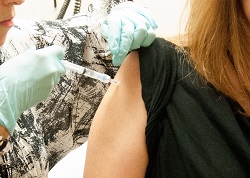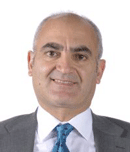 |
| A 39-year-old woman receives a dose of the experimental vaccine at the NIH Clinical Center.--Courtesy of NIAID |
The race for an Ebola vaccine is ramping up with positive Phase I data from an experimental vaccine made by GlaxoSmithKline ($GSK) and the NIH's National Institute of Allergy and Infectious Diseases (NIAID). Given those results, larger trials could be on the way soon.
In a study published in the New England Journal of Medicine, half of the 20 volunteers received a lower-dose jab, while the other half got a higher dose. After four weeks, all 20 had developed Ebola antibodies, with those who got the higher dose showing higher levels.
Based on the positive results, GSK and NIAID will continue their accelerated plan for larger trials "to determine if the vaccine is efficacious in preventing Ebola infection," NIAID Director Anthony Fauci said in a statement.
According to an NIAID release, the vaccine was well-tolerated and, aside from brief fevers in two volunteers, caused no serious side effects.
 |
| GSK Vaccines Chairman Moncef Slaoui |
"We are very encouraged by these positive first trial results showing this type of vaccine has an acceptable safety profile and can produce an immune response against Ebola in humans," Glaxo's vaccines chair, Moncef Slaoui, said in a statement.
The vaccine uses a chimpanzee cold virus to carry segments of genetic material from two strains of ebolavirus: Sudan and Zaire, which is responsible for the current epidemic in West Africa. The vaccine does not contain ebolavirus itself, so it cannot infect people with Ebola.
This bivalent vaccine was developed by scientists at the NIAID Vaccine Research Center and at Okairos, a biotech that GSK acquired in 2013. Glaxo and the NIH are also conducting tests in England, the U.S., Mali and Switzerland on a monovalent vaccine that targets the Zaire strain. According to a GSK release, development of GSK's candidate is progressing at an unprecedented rate, with more data from these trials expected by the end of the year.
If the trials are successful, the next phase will begin in 2015 and will involve the vaccination of thousands of front-line healthcare workers in Sierra Leone and Liberia. GSK is working with the World Health Organization (WHO) to find ways to accelerate the development of the Ebola candidate vaccine.
Many of Glaxo's peers are working on development of their own prospects, too. Merck ($MRK) recently signed a licensing agreement with NewLink Genetics ($NLNK) to research, develop, manufacture and distribute NewLink's Ebola vaccine, currently in Phase I trials. Johnson & Johnson ($JNJ), Novavax ($NVAX) and Profectus Biosciences are also working on Ebola vaccines, while a team at the University of Texas at Austin is developing an inhaled vaccine.
- read the study abstract
- here's the NIAID release
- and here's the GlaxoSmithKline statement
Special Reports: The top 5 vaccine makers by 2013 revenue - GlaxoSmithKline | 10 drugs that could stop Ebola